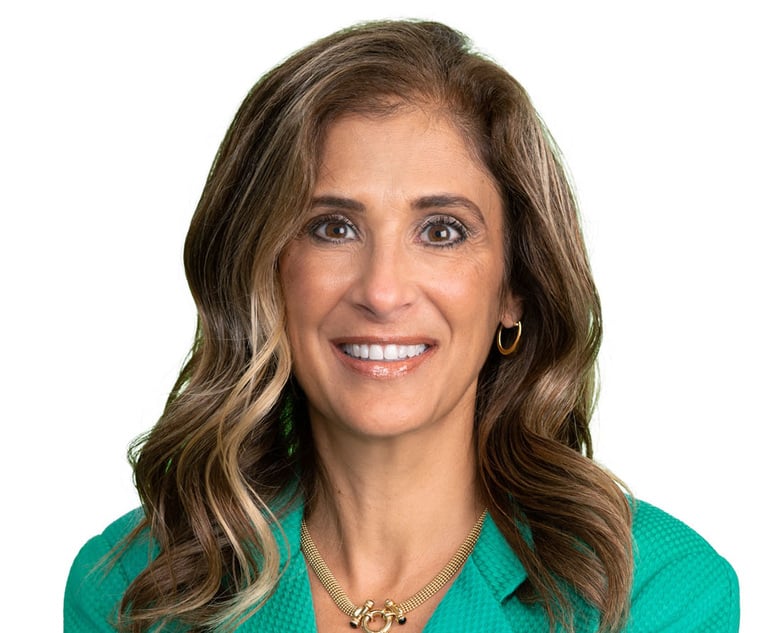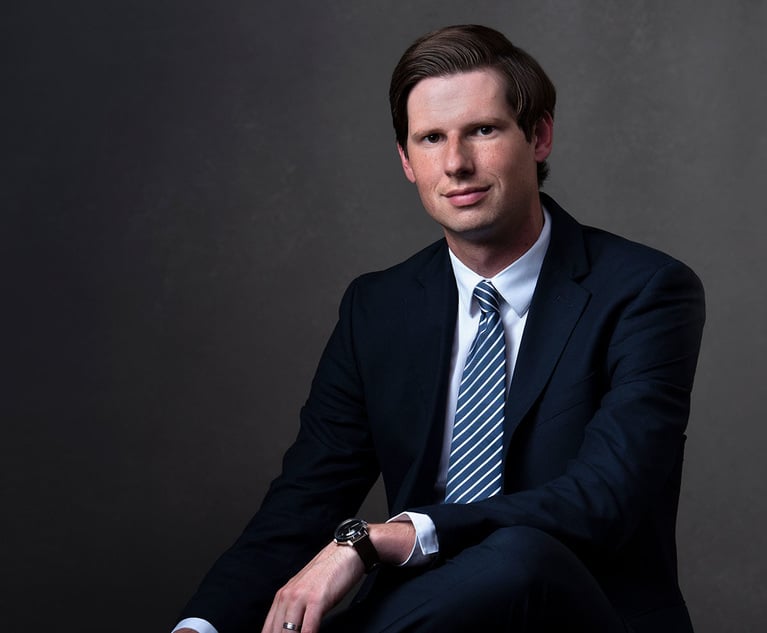Appeal of Phila. Judge's Decision to Replace DA With Special Prosecutor Now Before Justices
The Superior Court rejected Philadelphia Court of Common Pleas Judge Anne Marie Coyle's portrayal of the incident as one in which she had no choice but to appoint a replacement prosecutor because the Philadelphia District Attorney's Office had "'removed itself'" from the case.
December 16, 2019 at 04:26 PM
6 minute read
 Benjamin Franklin bridge in Philadelphia. (Photo: Shutterstock)
Benjamin Franklin bridge in Philadelphia. (Photo: Shutterstock)
The Pennsylvania Supreme Court is the only appellate court with the authority to review a Philadelphia trial judge's controversial decision to replace the Philadelphia District Attorney's Office with a special prosecutor in a probation violation matter, the state Superior Court has ruled, more than a year after the trial court's order was entered.
In a precedential Monday opinion in Commonwealth v. Mayfield, a three-judge Superior Court panel led by Judge Susan Peikes Gantman unanimously ruled to transfer the appeal to the Supreme Court, saying the justices have "exclusive jurisdiction over this case because it involves the supersession of a DA by the trial court."
"Consequently, the commonwealth was required to file a petition for review in the Supreme Court pursuant to Rule 3331(a), within 10 days of the court's order," Gantman said. "The interlocutory nature of the court's order did not change the commonwealth's responsibility in this regard. Filing a petition for review in the Supreme Court was the explicit procedural avenue for the commonwealth to challenge the trial court's appointment of a special prosecutor. Notwithstanding the commonwealth's mistaken filing in this court, we can transfer this case to the Supreme Court, as if it had been filed there on September 19, 2018, the same day as the trial court's order under review."
Gantman was joined President Judge Jack Panella and Senior Judge Dan Pellegrini.
In mid-September 2018, Philadelphia Court of Common Pleas Judge Anne Marie Coyle appointed a special prosecutor in the Mayfield case. The defendant, Demetrius Mayfield, had previously been convicted on a gun charge and was out on probation when he was arrested in early September 2018 on new charges related to alleged gun and drug possession.
The dispute arose after the Philadelphia District Attorney's Office chose to delay the violation of probation hearing until after Mayfield was tried on the latest charges.
Prosecutors contended that they were within their discretion to delay the hearing, but, in fiery courtroom exchanges, Coyle determined that prosecutors from the DA's Office had "removed themselves" from handling the case, and, on Sept. 19, 2018, she appointed a special prosecutor to handle the parole violation hearing.
According to transcripts of three proceedings in September 2018, there were several contentious exchanges between the judge, prosecutors and Mayfield's attorney about the judge's authority to make such an appointment, whether the judge was acting outside her role, and the merits of new policies put in place during District Attorney Larry Krasner's tenure.
"I'm sorry the district attorney does not like the law as it exists. My suggestion is if you don't like the law as it exists, talk to your legislature," Coyle said Sept. 27, 2018, according to transcripts and Gantman's opinion. "It is the job of the district attorney to enforce the law as it exists and represent the interests of the commonwealth of Pennsylvania. Not the law that he wishes it to be."
On appeal, Gantman rejected Coyle's portrayal of the incident as one in which she had no choice but to appoint a replacement prosecutor.
"Instantly, the record confirms the trial court actively removed the DA from this case and appointed a special prosecutor," Gantman said. "Throughout the proceedings, the trial court isolated certain statements from different ADAs to support the court's position that the DA 'removed itself' from the proceedings. As well, in its Rule 1925(a) opinion, the trial court repeatedly denied removing the DA, classifying the DA's actions as, inter alia, an 'abdication of representation responsibility,' 'surrender[ing]' of legal representation, 'withdrawing or withholding legal representation,' 'admitted [withdrawal] of representation,' 'refusing to represent the legitimate interests of the commonwealth,' and 'obstructionist abdication of sworn duty.' When viewed in their entirety, however, the transcripts from the multiple hearings in this case make clear the trial court removed the DA because the DA's policy to defer conducting the revocation hearing until after disposition of appellee's new charges interfered with the court's calendar."
Nevertheless, Gantman said that, under 42 Pa.C.S.A. Section 722 , the Supreme Court has exclusive jurisdiction to hear direct appeals from the courts of common pleas in cases involving "'supersession of a district attorney by an attorney general or by a court.'"
In addition, Gantman said, Pennsylvania Rule of Appellate Procedure 3331(a)(1) gives the justices exclusive jurisdiction over "'an order relating to the supersession of a district attorney by an attorney general or by a court, or to the appointment, supervision, administration or operation of a special prosecutor.'"
"In its opinion, the trial court suggests for the first time that its use of the term 'special prosecutor' was a misnomer, and the court merely made a 'limited appointment,'" Gantman said in a footnote. "In any event, the Supreme Court has exclusive jurisdiction over this case because it involves the supersession of a DA by the trial court. The case rightly belongs in the Supreme Court."
A spokesperson for the District Attorney's Office said the office was reviewing the opinion and did not have a comment.
Mayfield's attorney, Joseph Coleman of Montoya Coleman, said the Superior Court's finding that the District Attorney's Office did not remove itself from the case—but rather was removed by Coyle and replaced with a special prosecutor—could prove persuasive to the Supreme Court when determining whether the trial court's actions were proper.
"I still believe she did that without any authority," Coleman said. "I look forward to the Supreme Court's opinion, because I think they will agree that she did so did so without authority."
In the wake of Coyle's ruling last year, several Pennsylvania defense attorneys and ex-prosecutors said the move was an unusual one that may not pass constitutional muster.
Read More
Special Prosecutor Appointed to Replace DA in Probation Matter Wants Off Case
Attorneys Question Phila. Judge's Decision to Replace DA With Special Prosecutor
This content has been archived. It is available through our partners, LexisNexis® and Bloomberg Law.
To view this content, please continue to their sites.
Not a Lexis Subscriber?
Subscribe Now
Not a Bloomberg Law Subscriber?
Subscribe Now
NOT FOR REPRINT
© 2025 ALM Global, LLC, All Rights Reserved. Request academic re-use from www.copyright.com. All other uses, submit a request to [email protected]. For more information visit Asset & Logo Licensing.
You Might Like
View All
People in the News—Jan. 23, 2025—Marshall Dennehey, Duane Morris, Hangley Aronchick
3 minute read
Plaintiff Argues Jury's $22M Punitive Damages Finding Undermines J&J's Talc Trial Win
4 minute read
Pa. High Court: Concrete Proof Not Needed to Weigh Grounds for Preliminary Injunction Order
4 minute read
Trending Stories
- 1'Ridiculously Busy': Several Law Firms Position Themselves as Go-To Experts on Trump’s Executive Orders
- 2States Reach New $7.4B Opioid Deal With Purdue After SCOTUS Ruling
- 3$975,000 Settlement Reached After Fall on Sidewalk
- 4'Where Were the Lawyers?' Judge Blocks Trump's Birthright Citizenship Order
- 5Big Law Sidelined as Asian IPOs in New York Are Dominated by Small Cap Listings
Who Got The Work
J. Brugh Lower of Gibbons has entered an appearance for industrial equipment supplier Devco Corporation in a pending trademark infringement lawsuit. The suit, accusing the defendant of selling knock-off Graco products, was filed Dec. 18 in New Jersey District Court by Rivkin Radler on behalf of Graco Inc. and Graco Minnesota. The case, assigned to U.S. District Judge Zahid N. Quraishi, is 3:24-cv-11294, Graco Inc. et al v. Devco Corporation.
Who Got The Work
Rebecca Maller-Stein and Kent A. Yalowitz of Arnold & Porter Kaye Scholer have entered their appearances for Hanaco Venture Capital and its executives, Lior Prosor and David Frankel, in a pending securities lawsuit. The action, filed on Dec. 24 in New York Southern District Court by Zell, Aron & Co. on behalf of Goldeneye Advisors, accuses the defendants of negligently and fraudulently managing the plaintiff's $1 million investment. The case, assigned to U.S. District Judge Vernon S. Broderick, is 1:24-cv-09918, Goldeneye Advisors, LLC v. Hanaco Venture Capital, Ltd. et al.
Who Got The Work
Attorneys from A&O Shearman has stepped in as defense counsel for Toronto-Dominion Bank and other defendants in a pending securities class action. The suit, filed Dec. 11 in New York Southern District Court by Bleichmar Fonti & Auld, accuses the defendants of concealing the bank's 'pervasive' deficiencies in regards to its compliance with the Bank Secrecy Act and the quality of its anti-money laundering controls. The case, assigned to U.S. District Judge Arun Subramanian, is 1:24-cv-09445, Gonzalez v. The Toronto-Dominion Bank et al.
Who Got The Work
Crown Castle International, a Pennsylvania company providing shared communications infrastructure, has turned to Luke D. Wolf of Gordon Rees Scully Mansukhani to fend off a pending breach-of-contract lawsuit. The court action, filed Nov. 25 in Michigan Eastern District Court by Hooper Hathaway PC on behalf of The Town Residences LLC, accuses Crown Castle of failing to transfer approximately $30,000 in utility payments from T-Mobile in breach of a roof-top lease and assignment agreement. The case, assigned to U.S. District Judge Susan K. Declercq, is 2:24-cv-13131, The Town Residences LLC v. T-Mobile US, Inc. et al.
Who Got The Work
Wilfred P. Coronato and Daniel M. Schwartz of McCarter & English have stepped in as defense counsel to Electrolux Home Products Inc. in a pending product liability lawsuit. The court action, filed Nov. 26 in New York Eastern District Court by Poulos Lopiccolo PC and Nagel Rice LLP on behalf of David Stern, alleges that the defendant's refrigerators’ drawers and shelving repeatedly break and fall apart within months after purchase. The case, assigned to U.S. District Judge Joan M. Azrack, is 2:24-cv-08204, Stern v. Electrolux Home Products, Inc.





